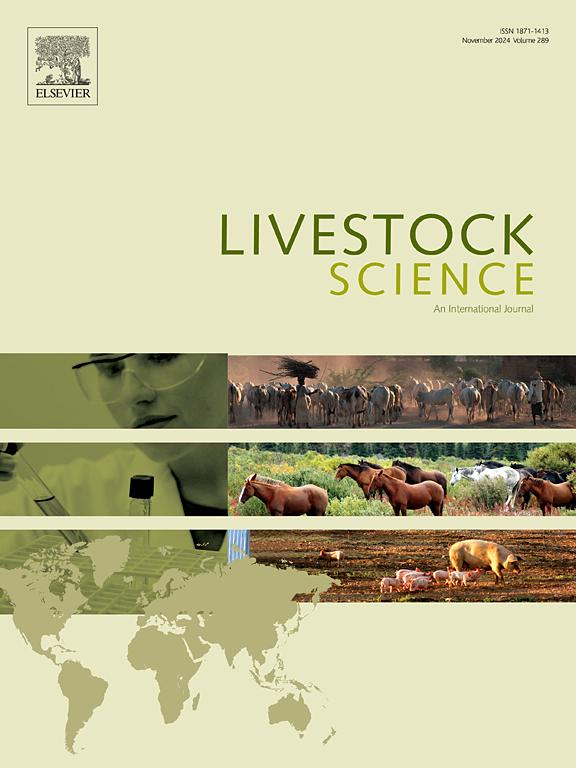麻叶对肉牛采食量、消化及瘤胃发酵参数的影响
IF 1.9
3区 农林科学
Q2 AGRICULTURE, DAIRY & ANIMAL SCIENCE
引用次数: 0
摘要
大麻(大麻sativa L.)种植产生副产品(即籽饼和叶子),如果不放在现有市场上,可能会被浪费。通过将这些副产品喂给牲畜,可以减少这种浪费。大麻籽粉(HSM)已被批准在美国家禽饲料中≤20%的膳食添加。然而,HSM也用于人类市场,降低了其作为牲畜饲料的经济可行性。研究表明,大麻叶具有与传统牧草相似的营养价值,可能是一种适合反刍动物的饲料;然而,缺乏体内消化率的研究。本研究旨在评价添加3.9 mg/kg体重(BW)大麻二酚酸(CBDA)对肉牛采食量、消化和瘤胃发酵的影响。瘤胃空心肉牛(n = 5)先饲喂干草和苜蓿块15 d,然后以3.9 mg/kg BW的CBDA添加麻叶,连续饲喂14 d。饲粮中添加大麻显著提高了饲粮采食量和全消化道有机物和中性洗涤纤维消化量(P≤0.01)。各处理对瘤胃氨氮、总挥发性脂肪酸浓度和pH均无影响(P≥0.60)。大麻添加量影响了乙酸、丙酸和丁酸的摩尔比(P≤0.01)。这些数据表明,在规定剂量(3.9 mg/kg BW CBDA)下,大麻叶可以补充给牛,而不会对日粮利用或瘤胃发酵产生负面影响。未来的研究应该在更高水平的大麻夹杂物和/或总混合口粮中证实这些发现。本文章由计算机程序翻译,如有差异,请以英文原文为准。
The effect of hemp leaves on intake, digestion, and rumen fermentation parameters in beef steers
Hemp (Cannabis sativa L.) cultivation creates by-products (i.e., seedcake and leaves) that, if not placed in an existing market, may be wasted. This waste could be mitigated by feeding these by-products to livestock. Hempseed meal (HSM) has been approved for poultry feed in the U.S. at ≤20 % dietary inclusion. However, HSM is also used in human markets, reducing its economic viability as livestock feed. Research has indicated that hemp leaves have similar nutritive value to conventional forages and may be a suitable feed for ruminants; however, in vivo digestibility studies are lacking. The objective of this study was to evaluate the effect of hemp leaf supplementation at a dose of 3.9 mg/kg body weight (BW) cannabidiolic acid (CBDA) on intake, digestion, and rumen fermentation in beef steers. Ruminally cannulated beef steers (n = 5) were fed hay and alfalfa cubes for 15-d then fed the same diet supplemented with hemp leaves at 3.9 mg/kg BW CBDA per day for 14-d. Hemp supplementation significantly increased forage intake and total tract digestion of organic matter and neutral detergent fiber (P ≤ 0.01). There were no effects of treatment on ruminal ammonia, total volatile fatty acid concentrations, or ruminal pH (P ≥ 0.60). Hemp supplementation affected molar proportions of acetate, propionate and butyrate (P ≤ 0.01). These data indicate that hemp leaves can be supplemented to cattle at the dose provided (3.9 mg/kg BW CBDA) without negatively impacting diet utilization or rumen fermentation. Future research should confirm these findings at higher levels of hemp inclusion and/or in total mixed rations.
求助全文
通过发布文献求助,成功后即可免费获取论文全文。
去求助
来源期刊

Livestock Science
农林科学-奶制品与动物科学
CiteScore
4.30
自引率
5.60%
发文量
237
审稿时长
3 months
期刊介绍:
Livestock Science promotes the sound development of the livestock sector by publishing original, peer-reviewed research and review articles covering all aspects of this broad field. The journal welcomes submissions on the avant-garde areas of animal genetics, breeding, growth, reproduction, nutrition, physiology, and behaviour in addition to genetic resources, welfare, ethics, health, management and production systems. The high-quality content of this journal reflects the truly international nature of this broad area of research.
 求助内容:
求助内容: 应助结果提醒方式:
应助结果提醒方式:


